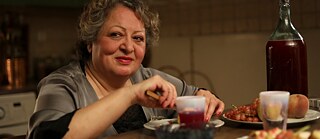A seventy-year-old widow seeks happiness once again: Maryam Moghaddam and Behtash Sanaeeha's “My favourite cake” is a touching film about freedom and hope. The regime in Iran banned them from travelling to the Berlinale.
At the press conference for the Iranian film “My Favorite Cake”, the lead actors, Lili Farhadpour and Esmaeel Mehrabi, sat next to two empty seats. Upon them sat portraits of the writer-director duo, Maryam Moghaddam and Behtash Sanaeeha, who were unable to attend the festival - and the world premiere of their own film, at the 74th Berlinale film festival. The Iranian authorities had confiscated their passports. The organisers put out the empty chairs as a gesture of solidarity, one that has become a custom with Iranian directors.The film includes a ticklist of taboos that were bound to irritate the Iranian authorities: a woman without a hijab, dancing, drinking wine and attacking the religious police. In short, everything needed to qualify as an anti-regime film. Yet on a deeper level, “My Favorite Cake” also speaks to more universal questions than these local concerns, relating to everyone’s right to pursue love and happiness, no matter his or her age.
Rebelling against loneliness
Mahin (Lili Farhadpour) is a 70-year-old woman. She has lived alone since her husband died 30 years ago, and her children have left the country. She suffers suffocating loneliness, boredom, and intermittent contact with both her children and friends of her age. On one occasion, she meets up with friends for a session of gossip and banter, something we learn is a rare occurrence due to distance and ill health. Yet the scene also reveals what these women long for: human warmth, love and affection, and the feeling that life still offers more than a slow wait for death.In most countries, Mahin’s challenge would be to overcome her feeling of being old and then to find a suitable man to start a romance with. However in Iran - or rather, in any conservative society governed by strict rules that restrict and classify women, each according to her age and marital status – he challenge is more akin to revolutionary mission, demanding courage and even recklessness to go out in public to search for a suitable lover.
From bakery to park to restaurant, Mahin searches light-heartedly for love. Finally, she meets Faramarz (Esmaeel Mehrabi), an old, lonely taxi driver. Their relationship evolves from a feminine plan concocted by Mahin, which the man at first fails to understand, into into game of love into which he rushes with childish haste, and finally a sweet crescendo. The audience is left with a bittersweet mix of gratification that the heroes found happiness and love after their years of suffocating loneliness, and certainty that this joy is not destined to last.
STRUGGLE FOR PRIVATE HAPPINESS
In a country where neighbours keep a careful lookout for the next opportunity to interfere in each others’ affairs, where everyone thinks about the identity of everyone else’s visitors, and police patrol the parks to arrest women on charges of showing a lock of hair in public, love becomes a privilege out of the reach for many. Such a privilege comes with special conditions, requirements that Maheen and Faramarz cannot meet.My Favourite Cake combines lightness, romance and anticipation of disaster, to create one of the sweetest films at the 74th Berlinale, a work that can be understood anywhere in the world. Yet it has special power for those hail from places where those searching for love suffer more than most.
February 2024
